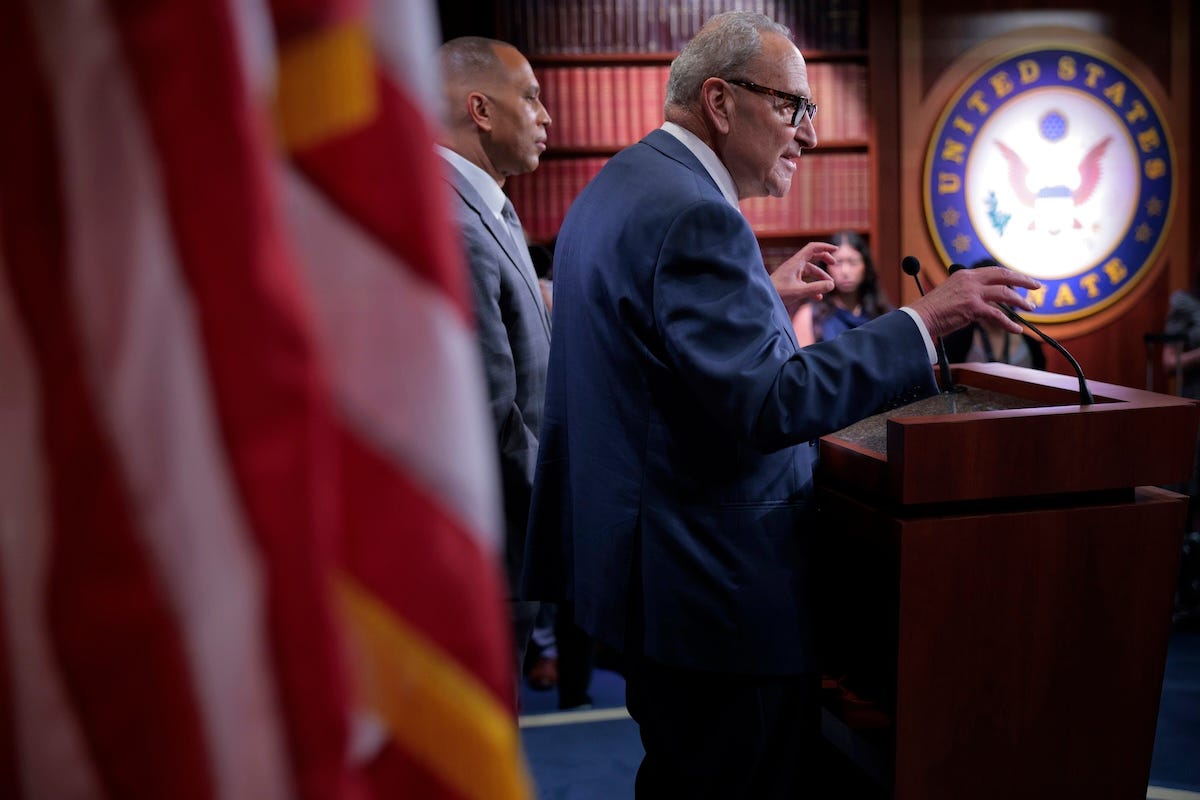20 Thoughts On The Government Shutdown
Fighting is good; fighting smart is better.
I said my piece in several articles over the past many weeks, detailing why Democrats should deny Republicans their votes to fund the government, and how they should approach the standoff.
Well, Democrats have denied Republicans their votes; Republicans don’t have enough votes in their majorities to keep the government open on a partisan basis; and the government has, thus, shut down. Now that we’re here, I want to offer some further thoughts on how we reached this point, what it means, and where Dems should go next.
At least insofar as it shows Democratic leaders have become more responsive to their voters, who overwhelmingly want to see the party fight Donald Trump harder, I am glad we’re here in a shutdown, rather than raging at Chuck Schumer for surrendering preemptively once again.
But insofar as Democrats approached the funding deadline without a plan, cobbled one together clumsily and late in the game, and entered the shutdown in a confused posture that they are unlikely to sustain, I have serious misgivings about the terms they set for the fight.
The confusion in their posture stems from the fact that public misgivings over the Trump regime arise from his dictatorial abuses rather than quotidian policy disputes, but Democrats outsource their strategic thinking to pollsters and strategists who try to steer every crisis toward health care in knee-jerk fashion.
In short (and to repeat myself) as long as Democrats insist their bottom-line demand pertains to extraneous health-care subsidies, I suspect they will have a difficult time maintaining an upper-hand in the determinative battle for public opinion. And that risks squandering their latest and perhaps final opportunity to either pull the country back from the brink of constitutional collapse, or tacitly declare “no confidence” in the Trump regime.
The fact that the animating dispute in this standoff (as opposed to the health-care dispute Democrats tacked on to it) pertains to defending the Constitution (including the inviolability of the budget itself) makes this different from any earlier shutdown fight.
And that is what makes it winnable—it provides Democrats a principled posture that they can maintain until Republicans either yield, or cut bait and abolish the filibuster.
Indeed, I think Democrats could stick to their guns indefinitely and persuasively by making the case that they can’t be asked to vote for a budget deal that Donald Trump and the GOP have promised to violate. Insisting on germane concessions that tend to hold Trump to his word and bring him closer into compliance with the law and Constitution is sustainable.
In reality, they aren’t even concessions. Trump is insisting that Democrats concede him the extraneous right to violate budget agreements! What Democrats can and should be asking for is a clean budget under regular order.
I use these terms—extraneous, germane, regular order—for the purposes of persuading Democratic elites that they should stake out different grounds for fighting, not because I think Democrats themselves should use those terms on the hustings. The whole idea is that they are likelier to win the battle for public opinion, and thus the legislative fight, if their argument is clear, ironclad, impossible to refute. No votes for lawbreaking, no votes for a deal Trump will break.
This is Matt’s formulation, but it illustrates why I think Democrats have chosen a poor basis for this fight: It’s worth imagining Democrats defending their obstinance in the coming days and weeks. “We’re holding out to make Republicans fund health-care priorities they oppose” is an argument that won’t carry the day in most fora. At some point even people facing large premium increases will say “maybe you should debate this separately.” But Democrats could convene town hall events with furloughed government employees and hold this ground: “We are sorry and outraged that the consequences of this shutdown are falling on you, but Trump and the GOP are promising to renege on the terms of any budget agreement, and there’s just no way we can provide them our votes under those conditions.” They could even make that case on Fox News.
The best critic on the other side of this analysis is Josh Marshall, who argues, in essence, that we don’t really know enough to have strong views about how Democrats should prosecute this fight. There haven’t been enough government shutdowns to reduce the dynamics to theory. It may well be that the public blames Republicans for shutdowns no matter the underlying dynamics, because Republicans define themselves by hostage taking, procedural hardball, and hostility to government. All else equal, blaming Republicans is a reasonable inference.
But I think he might come around if he ran the thought experiment in point nine. In fact, I think you can spot a concession in his own argument. He writes:


